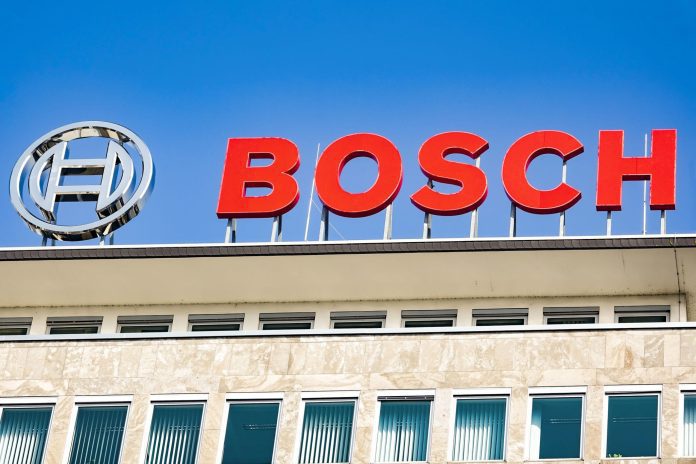Bosch is preparing to ramp up production again after shutting down production at nearly 100 facilities globally in the COVID-19 pandemic, on the back of a 17 percent slowdown in March, a 7.3 percent fall in the first quarter, and a refusal to forecast sales for the year because of “many imponderables”.
The company said it will put focus on driving efficiencies in order to recover lost ground, including with use of 5G and AI technologies in its own production facilities, whilst continuing to automate production of COVID-19 test kits and protective gear.
Bosch has switched over production in recent months to produce high volumes of test devices, face masks, and disinfectant for the healthcare sector. It will make use of the testing and protective equipment at its own sites as it ramps up production. The company has already turned production back on at 40 sites in China.
Stefan Asenkerschbaumer, chief financial officer, said: “We are bracing ourselves for a global recession that will also have a considerable impact on our own performance in 2020.” The company refused to make a forecast for 2020, but said automotive production will fall by at least 20 percent in the year.
Sales totalled €77.7 billion in 2019, 0.9 percent down on 2018. It generated earnings from operations before interest and taxes of €3.3 billion.
The company’s mobility solutions business generated sales of €46.8 billion. Revenues were 1.6 percent down on 2018. The company’s industrial technology business increased its sales by 0.7 percent to €7.5 billion. Revenues in its energy and building technology business rose 1.5 percent to €5.6 billion.
Asenkerschbaumer said: “In the medium term, our objective is to return to a roughly seven percent margin from operations, but without neglecting the essential tasks to secure our future. We are devoting all our energy to this.”
The company will rely upon longer term operational efficiencies achieved by the combination of 5G, IoT, and AI, as well as on “extensive measures” to reduce costs and secure liquidity, including reducing production, working hours, and salaries.
The company has secured its own spectrum licence to start roll out of private 5G networks at its factories. It has also made play of the role of AI in its manufacturing operations.
The company has raised more than €1.5 billion in revenue from the implementation of Industry 4.0 techniques in its own factories, as well as its customers’ factories, during the past four years. It has an incremental revenue target of €1 billion per annum by 2022 from applying digital-change solutions inside and outside of its own factories.
Volkmar Denner, chairman at the group, said: “A supreme effort must be made to achieve at least a balanced result. In this severe crisis, it is again an advantage for us that we are so diversified, with different business sectors.”
Bosch said it will produce more than a million rapid COVID-19 tests in 2020, increasing to three million next year. It expects to have a CE mark for its 150-minute tester by the end of May and an even faster 45-minute version soon.
Bosch has already started production of face masks. Thirteen Bosch plants in nine countries are now making face masks, with two fully automatic lines in Stuttgart, and further lines to be automated in Germany, India, and Mexico.
Bosch has made designs available to other companies free of charge. It reckons it can handle production of 500,000 masks per day. Denner said: “It took our special-purpose machinery unit just a few weeks to design the necessary machinery.” The company is also producing 5,000 litres of disinfectant per week in Germany and the US.
The company is putting continued focus on reducing carbon emissions. A year ago, it said it would be the first global industrial enterprise to be “climate neutral”, across all of its 400 facilities, by the end of 2020. It remains on track, it said, with its German operations already making the grade, and the overall status at 70 percent.
Bosch is pursuing “technology-neutral powertrain development”, it said. Two out of three newly registered vehicles in 2030 will still run on diesel or gasoline, with or without a hybrid option. “That is why the company is also continuing to invest in highly efficient combustion engines.”
At the same time, it wants to be a market leader in electromobility, and will invest €100 million in the production of electrical powertrain systems at its plants in Eisenach and Hildesheim.
Bosch said it is the first automotive supplier to commit to a measurable target on the “associated emissions” of its supply chain, committing to a 15 percent reduction by 2030, equivalent to more than 50 million metric tons per year. The firm has established a new advisory company, called Bosch Climate Solutions, to “make our experience available to other companies.”
Denner said: “Climate action remains crucial for humanity’s survival. It costs money, but doing nothing will cost even more. Politics must not stand in the way of companies expanding their ingenuity and using technology to benefit the environment – without harming prosperity.”
The Bosch chief called for Europe to move into the hydrogen economy and production of renewable synthetic fuels – “once coronavirus crisis has passed”. This is the only way Europe can become climate-neutral by 2050, he said. Bosch is working to commercialise mobile and stationary fuel-cell stacks by 2022 for use in vehicles and buildings, respectively. It reckons the market for fuel-cell power stations will be worth more than €20 billion by 2030.

